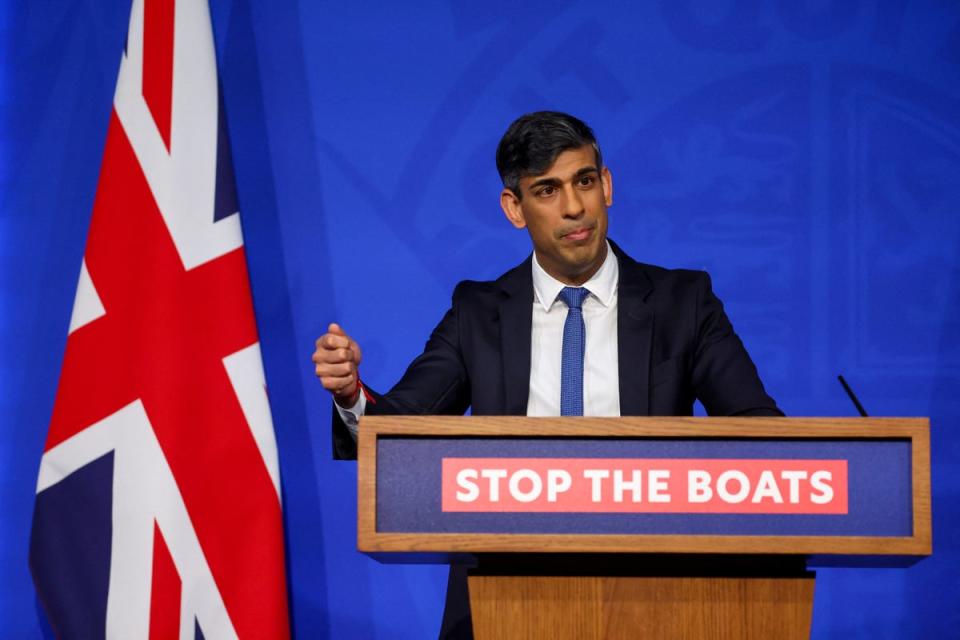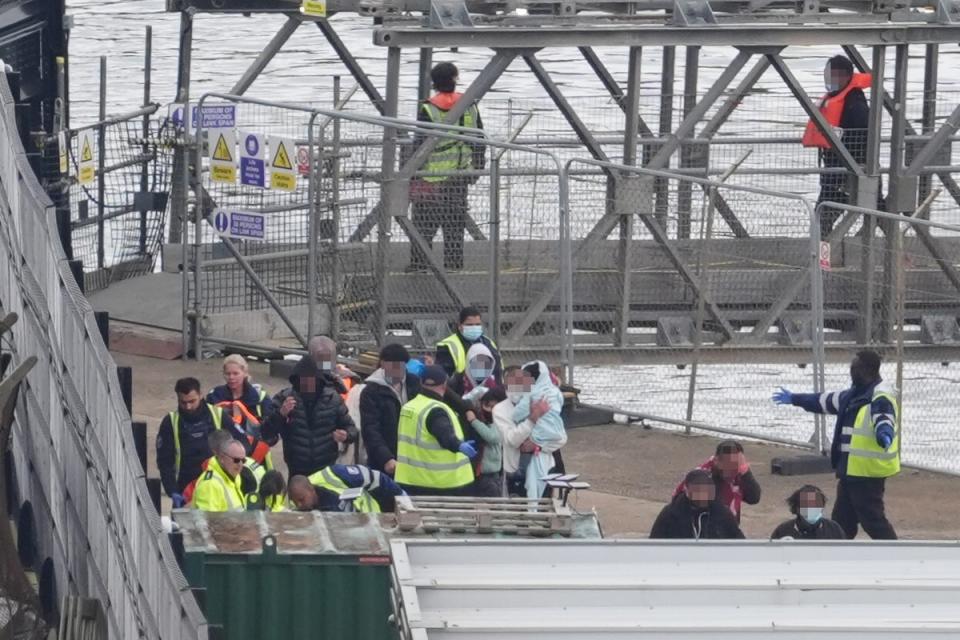Think again, PM: Sunak urged to U-turn on Rwanda plan as five die in Channel tragedy
A girl aged seven was among five migrants who died as they tried to cross the English Channel hours after parliament passed Rishi Sunak’s flagship Rwanda bill.
The tragic deaths prompted senior figures in the United Nations to urge the prime minister to reconsider his controversial plan to send asylum seekers who arrive on small boats on a one-way flight to Rwanda.
The victims were caught up in a panicked crush when their small craft, vastly overloaded with 112 people, ran aground on a sandbank shortly after setting off from the French coast.
French navy sailors found them and took them ashore as they rescued 47 survivors from the stricken vessel. More than 50 others left on board managed to get the engine working again and continued towards Britain.
Mr Sunak said the tragedy underscored the need for his Rwanda plan, which he hopes will create a deterrent effect. But leading lawyers, a former national security adviser, and opposition MPs said the plan was doomed to fail as it would not stop migrants from making the journey.
Hours after the tragedy, boats similarly packed with asylum seekers were photographed leaving French shores.
Filippo Grandi, the UN high commissioner for refugees, said the legislation “marks a further step away from the UK’s long tradition of providing refuge to those in need, in breach of the Refugee Convention”.
The human rights arm of the Council of Europe – whose institutions include the European Court of Human Rights, whose oversight Mr Sunak has threatened to withdraw from over the policy – said it raised “major issues about the human rights of asylum seekers and the rule of law”.
Lawyer and crossbench peer Alex Carlile told The Independent that Mr Sunak should “think again” and “drop the politics and the boasts”.
“There is no evidence that this scheme will do more than remove about 1 per cent of the unresolved refugees,” he said.
Former national security adviser Peter Ricketts, who is also a crossbench peer, said he did not think the Rwanda bill would make the “slightest difference to the number of desperate people risking their lives to get here”.
Sir Keir Starmer said there is “no doubt that we have to stop these small boat crossings” but he added that he would “build up our border security, to take down the gangs that are running this vile trade and stop those boats arriving in the first place. Not a gimmick which nobody thinks is going to work.”
Labour also made clear that it does not plan to send any asylum seekers to Rwanda if it enters Downing Street, not even as an interim measure while it scraps the scheme.

But Tory MPs called on ministers to act swiftly to get planes in the air. Former business secretary Sir Jacob Rees-Mogg told The Independent: “I agree with the prime minister: stopping the boats will prevent such tragedies, and the sooner the flights start the better.”
The plan is set to become law later this week, clearing the way for flights to Rwanda to begin within 12 weeks. However, the government is braced for a series of legal challenges.
Aside from the seven-year-old girl, the other migrants who died on Tuesday were a woman and three men. The victims appear to have been caught up in a panic when a small boat ran aground on a sandbank not long after leaving the Plage des Allemands beach in Wimereux, near Boulogne-sur-Mer.
An aid worker who witnessed the return of the survivors said that the group included the father of the little girl who died.
Dany Patoux, of charity Osmose 62, said: “[He] fell into our arms right away. He was crying, in a daze. He saw his little daughter die before his eyes.”
French navy sailors discovered the victims “unconscious and in a serious condition” before taking them ashore where, despite resuscitation attempts, they died, according to Pas-de-Calais prefect Jacques Billant. Those rescued included Syrians, Iraqis, Turks and Iranians, he said.
Guirec Le Bras, the Boulogne-sur-Mer prosecutor, said an enquiry had been launched into “manslaugher, criminal association, and the assistance of foreigners in an irregular situation.”
Some alleged smugglers had been arrested before the tragedy and their nautical equipment confiscated, he said. He also confirmed that police had fought running battles with some migrants in the lead up to the drownings.
Video footage showed groups heading towards the English Channel as they tried to evade the officers at around 3am.
Once the migants were in the water, police retreated, in accordance with safety protocols, leaving around five boats to head towards England, including the one that became briefly stranded.

Mr Sunak has promised “multiple flights a month” to Rwanda, but ministers concede that the number of people sent to Kigali will be small at first, with chartered aircraft expected to be used.
The PM has come under fire for pushing through a bill that designates Rwanda a safe country despite a damning ruling from the Supreme Court late last year that it was not a safe place to send refugees.
The cost of putting each migrant on a plane is expected to be around £11,000, while Rwanda will get £20,000 for each asylum seeker relocated there and a £120m top-up once 300 have arrived.
Steve Valdez-Symonds, from Amnesty International UK, said: “We've already seen the government attempt to use these tragedies at sea as an excuse to brazenly push ahead with its cruel and reckless scheme to forcibly transport people seeking asylum to Rwanda.
“The Rwanda scheme won’t save lives, and – despite all the empty claims – it was never designed to. Rwanda is raw politics from a government that has totally lost sight of the people directly affected by its asylum policy.”
During one weekend this month, 748 migrants arrived in Kent after crossing the channel on small boats. Official figures show that 6,265 migrants have come to the UK in small boats so far this year.
Michael Tomlinson, the minister for illegal migration, said the government is braced for a series of legal challenges to the flights.

 Yahoo News
Yahoo News 
